iPhone 11 versus Pixel 4 -- Benchmark and hands on comparison
Google's Pixel 4 is the ideal, undiluted Android experience, and has features to separate itself from the rest of the pack. AppleInsider puts it side-by-side versus Apple's iPhone 11 lineup to see how they compare in specs and benchmarks.
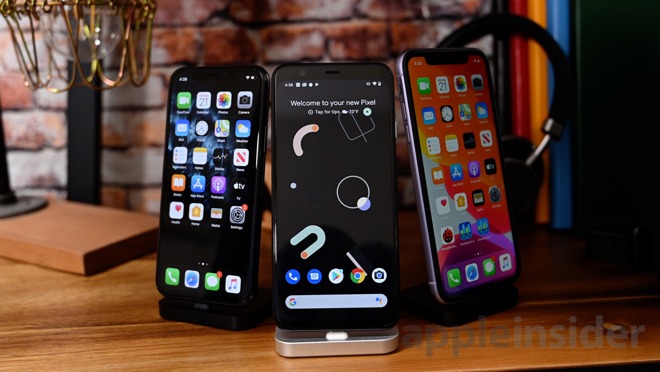
iPhone 11 Pro (left), Pixel 4 (center), and iPhone 11 (right)
Pixel 4 is 5.7 inches and has a 16:9 aspect ratio at full HD+ (2,280 x 1,080) and a pixel density of 444 ppi. Pixel 4 XL is Quad HD+ at 3,040 x 1,440 and 537 ppi. Both Pixels sport OLED displays.
Pixel 4 beats the iPhone 11 contrast ratio (1400 to 1) at 200,000 to 1 but falls far behind that of the iPhone 11 Pro and iPhone 11 Pro Max which bost 2,000,000 to 1 contrast ratios.
For brightness, the iPhone 11 is 625 nits, Pixel 4 is 445 nits, and the iPhone 11 Pro and iPhone 11 Pro Max are 800 nits -- though the latter two can go up to 1200 nits during HDR content playback.
Apple's iPhone 11 has True Tone on its displays but Pixel 4 now has Ambient EQ. This is very similar in that it dynamically changes the white balance of the display to match the room it is in, but in our testing, it is so subtle we can barely tell a difference.
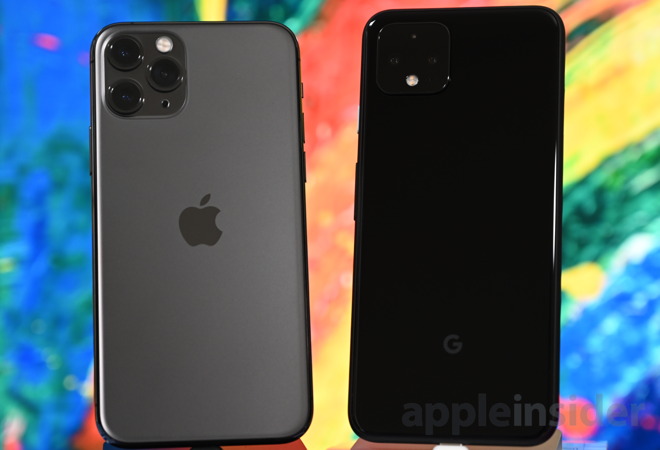
iPhone 11 Pro (left) and Pixel 4 (right)
The Pixel 4 also now has a new 90Hz refresh rate on the phone that kicks in when there is a lot of movement, particularly noticeable while scrolling. It does make scrolling and the OS as a whole more smooth, but most of the time it drops down to 60Hz to save on battery life -- something very much needed.
But, that 90Hz isn't universal. We're seeing a lot of problems with stuttering in Chrome. Yes, the Android flagship browser.
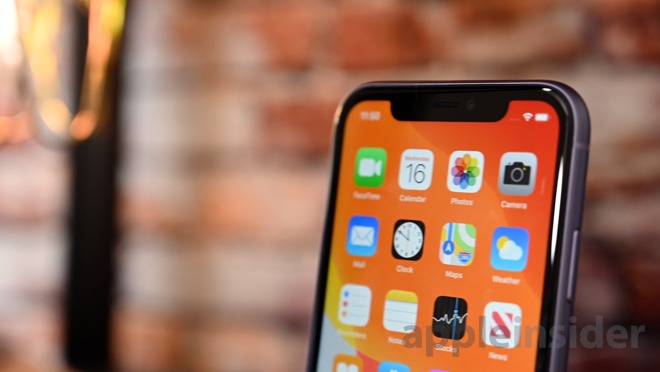
iPhone's notch
The hole-punch cutout of the Galaxy S10 is less intrusive, and Apple's iPhone 11 notch lies somewhere between. There's little point in debating which is better, a forehead, a notch, or a hole, because they are all compromises for the sake of technology. All are better than something protruding from the top of the phone.
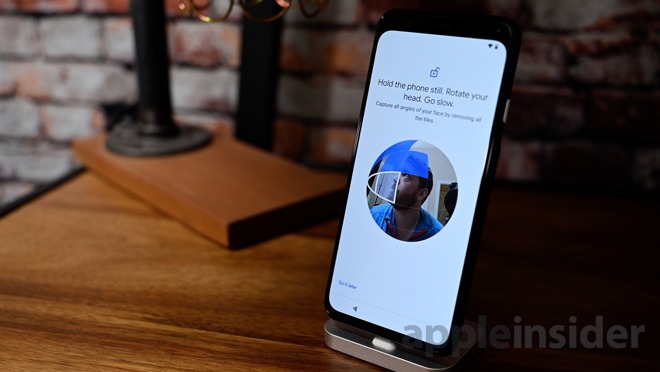
Face Unlock
Face Unlock works very similar to Face ID in that it projects a series of infrared dots on your face then scans them to match against its saved 3D profile of your face. This is in stark comparison to Samsung which was able to have its facial recognition fooled by a video of a user.
Google's Face Unlock in the Pixel 4 has one severe drawback, one that has been highly publicized leading up to the full launch -- a user's face can be used to unlock a device when the owner's eyes are closed. That has serious security implications because a phone can be unlocked when a user is asleep, unconscious, or in the worst-case scenario -- dead.
Google says that they're fixing this "in the coming months." There is no timetable other than that, though.
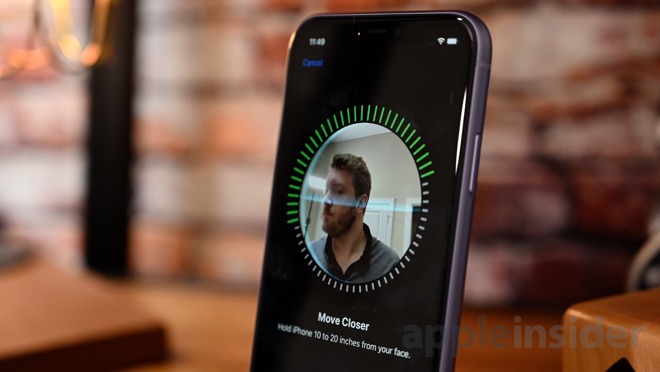
Setting up Face ID
Face ID tracks a user's eyes and can even require them to be looking at the camera for it to authenticate. This is somewhat unnerving as apps such as banking ones can all be authenticated this way and a lapse in security in this regard can be very dangerous.
Face Unlock is exceptionally fast, unlocking before you even have to worry about whether the phone is unlocked or not because of the radar in the phone detecting when the user is moving the phone to unlock. Compared to iPhone 11, we'd say the Pixel 4 is faster -- but only by a hair.
But, that lack of attention detection is a giant problem right now.
Using each of the phones, you aren't going to notice huge differences day-to-day. At this point in the smartphone story, all phones ship fast -- but the real question is how long they will stay that fast. These processors aren't built for now, they are built for a couple of years in the future when computational photography, AR, and other intensive applications start to be prolific.
When we do run these through our usual barrage of tests, the iPhone clearly wins out.
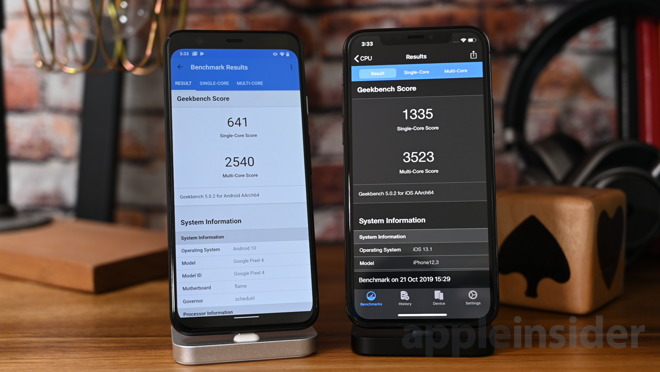
Geekbench 5 results
In Geekbench 5, our iPhone 11 garnered a 1335 single-core score and a 3523 multi-core score. That's compared to the 641 and 2540 scores from Pixel 4.
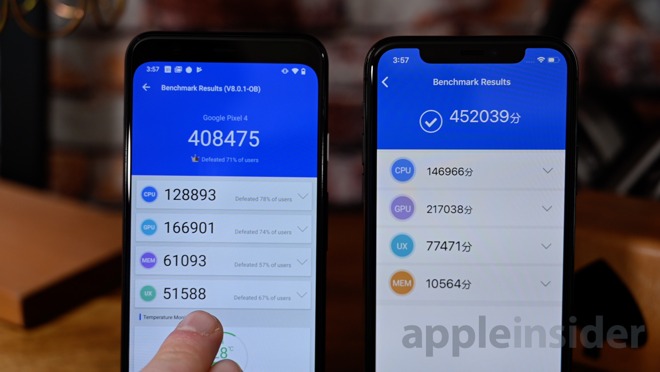
Antutu benchmark results
In the Antutu benchmark, iPhone 11 earned a cumulative score of 452039 whereas Pixel 4 earned a 408475.
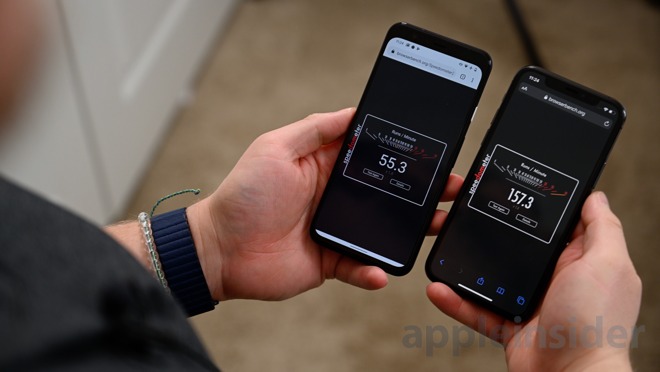
Speedometer results
Lastly, in our Speedometer browser benchmark, iPhone pulled out a 157.3 and Pixel 4 nabbed a 55.3.
If you are one of the few editing a RAW photo or exporting a long 4K video on your phone, you will notice the extra power of the iPhone 11 compared to the Pixel 4, but in daily use, you won't see the speed benefits pay off for a year or two. At that point, the iPhone 11 will be better suited.
What we did notice, was that the battery life on the Pixel 4 was pitiful. We never made it a full day -- even with normal non-benchmarking use -- compared to the iPhone 11, iPhone 11 Pro and iPhone 11 Pro Max that all made it through the day with power to spare.
On an average day, we got about four hours of screen time on the smaller Pixel 4. This is less of an issue with the larger 3,700mAh battery in the XL compared to the 2,800mAh in the smaller Pixel 4 but it still barely seems like enough.
We found ourselves disabling the 90Hz display, turning on dark mode during the day, and lowering the screen brightness on the Pixel 4 to stretch it out but this isn't something a user should have to do or even think about. We're hoping this is software inefficiencies on the new hardware, but phones with the same processor from Samsung don't seem to have this problem at all.
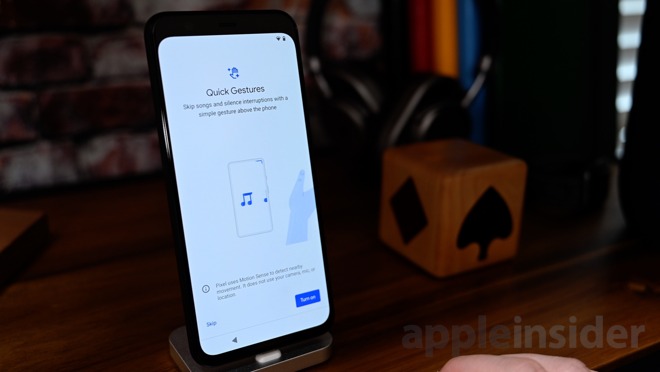
Motion Sense Quick Gestures
Right now, though, some applications of Motion Sense are gimmicky. Waving your hand to skip songs or navigate a podcast is excessive and when it doesn't work, it is far more frustrating than just tapping on the next button on the display.
We like the idea behind other features, such as dismissing a call with the casual wave of a hand. But it doesn't always work.
Where Motion Sense came into play was with its proactive features, like the display turning off when the user walks away. Of course, we don't often set our phone down, leave it on, and walk away -- but it is still a cool idea.
It also will quiet your alarm as your hand approaches the phone. And when it sees you reach for the phone, it automatically fires up face unlock. That, in part, is why Face Unlock on the Pixel 4 is so darn fast.
Apple has a similar feature with its True Depth camera system. It watches your eyes and whenever you look away and the iPhone loses your focus, it dims the screen a bit. This is in the same vein as Motion Sense but far more limited -- at least at the moment.
A ton of effort goes into diligently comparing shots on one phone versus another. In fact -- we will be doing a deep dive in a future piece.
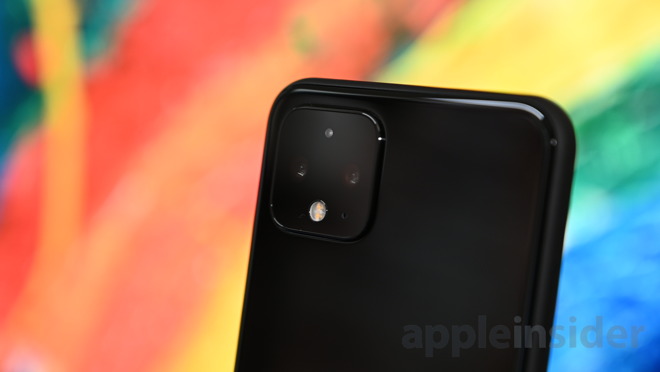
Pixel 4 camera
But, today, we will keep things short. The iPhone has three 12MP cameras -- ultra-wide, wide, and tele. Google, defiantly chose not to include an ultra-wide lens like Apple and Samsung but instead added a 16MP tele lens to its existing 12.2MP wide angle.
Google says that people care more about zoom than they do going ultra-wide, and we can see its point of view. By making the tele lens 16 megapixels we can see a huge boost in quality when looking at zoomed-in shots. There is easily more detail on the Pixel 4 than the iPhone. However, it cannot take wider portrait shots nor the stylized ultra-wide variety.
We'd just preferred Google went all-in and gave it an ultra-wide lens alongside the new tele lens, but for now, it is a compromise.
Both cameras take amazing shots as it stands. Pixel 4 has its own style that you can easily recognize and the iPhone 11 attempts to be a bit more neutral.
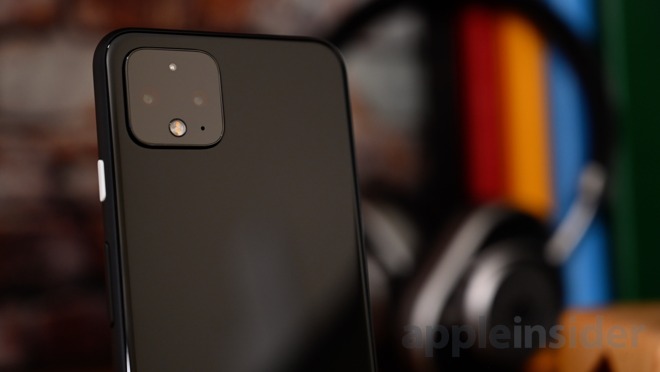
Dual cameras on the Pixel 5
The biggest drawback of the Pixel 4 is video. It can only shoot 4K video at 30 frames per second, and is limited to only 1080P on the selfie cam. Apple can do 4K on iPhone 11's selfie camera and 60 frames per second on the rear cameras.
Unless you are focused on video features, don't let the camera be the deciding factor for you between these two handsets because both sets of photos are great and they take better photos than any other smartphones out there.
We've compared a lot here, but it mostly comes down to the user experience and a preference for iOS or Android.
Those that choose to opt for the iPhone 11 can also find savings on new models at the following wireless carriers:
iPhone 11 deals
iPhone 11 Pro (left), Pixel 4 (center), and iPhone 11 (right)
Size and display
The 2019 iPhone line is split into three handsets -- iPhone 11, iPhone 11 Pro, and iPhone 11 Pro Max. iPhone 11 sports a 6.1-inch LCD display with a resolution of 1792by828 pixels at 326 ppi. iPhone 11 Pro has an updated OLED Super Retina XDR display measuring 2436by1125 at 458 ppi and iPhone 11 Pro Max measures up at 2688by1242 at 458 ppi.Pixel 4 is 5.7 inches and has a 16:9 aspect ratio at full HD+ (2,280 x 1,080) and a pixel density of 444 ppi. Pixel 4 XL is Quad HD+ at 3,040 x 1,440 and 537 ppi. Both Pixels sport OLED displays.
Pixel 4 beats the iPhone 11 contrast ratio (1400 to 1) at 200,000 to 1 but falls far behind that of the iPhone 11 Pro and iPhone 11 Pro Max which bost 2,000,000 to 1 contrast ratios.
For brightness, the iPhone 11 is 625 nits, Pixel 4 is 445 nits, and the iPhone 11 Pro and iPhone 11 Pro Max are 800 nits -- though the latter two can go up to 1200 nits during HDR content playback.
Apple's iPhone 11 has True Tone on its displays but Pixel 4 now has Ambient EQ. This is very similar in that it dynamically changes the white balance of the display to match the room it is in, but in our testing, it is so subtle we can barely tell a difference.
iPhone 11 Pro (left) and Pixel 4 (right)
The Pixel 4 also now has a new 90Hz refresh rate on the phone that kicks in when there is a lot of movement, particularly noticeable while scrolling. It does make scrolling and the OS as a whole more smooth, but most of the time it drops down to 60Hz to save on battery life -- something very much needed.
But, that 90Hz isn't universal. We're seeing a lot of problems with stuttering in Chrome. Yes, the Android flagship browser.
Forehead versus notch
The Pixel 4 is sporting a bit of a forehead, encroaching from the top and pushing the display down. It houses hardware such as the speaker and camera system.
iPhone's notch
The hole-punch cutout of the Galaxy S10 is less intrusive, and Apple's iPhone 11 notch lies somewhere between. There's little point in debating which is better, a forehead, a notch, or a hole, because they are all compromises for the sake of technology. All are better than something protruding from the top of the phone.
Facial recognition for authentication
All of the iPhone 11 models and both of the Pixel 4 units have face-based biometric authentication. Apple calls its Face ID while Google simply calls it "Face Unlock."Face Unlock
Face Unlock works very similar to Face ID in that it projects a series of infrared dots on your face then scans them to match against its saved 3D profile of your face. This is in stark comparison to Samsung which was able to have its facial recognition fooled by a video of a user.
Google's Face Unlock in the Pixel 4 has one severe drawback, one that has been highly publicized leading up to the full launch -- a user's face can be used to unlock a device when the owner's eyes are closed. That has serious security implications because a phone can be unlocked when a user is asleep, unconscious, or in the worst-case scenario -- dead.
Google says that they're fixing this "in the coming months." There is no timetable other than that, though.

Setting up Face ID
Face ID tracks a user's eyes and can even require them to be looking at the camera for it to authenticate. This is somewhat unnerving as apps such as banking ones can all be authenticated this way and a lapse in security in this regard can be very dangerous.
Face Unlock is exceptionally fast, unlocking before you even have to worry about whether the phone is unlocked or not because of the radar in the phone detecting when the user is moving the phone to unlock. Compared to iPhone 11, we'd say the Pixel 4 is faster -- but only by a hair.
But, that lack of attention detection is a giant problem right now.
Performance
Apple is rocking its custom-made A13 Bionic processor in all three of the iPhone 11 models. It has six cores and is blazing fast. The Pixel 4 and Pixel 4 XL is outfitted with the eight-core Snapdragon 855 processor -- the same as in the Samsung S10 and S10+.Using each of the phones, you aren't going to notice huge differences day-to-day. At this point in the smartphone story, all phones ship fast -- but the real question is how long they will stay that fast. These processors aren't built for now, they are built for a couple of years in the future when computational photography, AR, and other intensive applications start to be prolific.
When we do run these through our usual barrage of tests, the iPhone clearly wins out.
Geekbench 5 results
In Geekbench 5, our iPhone 11 garnered a 1335 single-core score and a 3523 multi-core score. That's compared to the 641 and 2540 scores from Pixel 4.
Antutu benchmark results
In the Antutu benchmark, iPhone 11 earned a cumulative score of 452039 whereas Pixel 4 earned a 408475.
Speedometer results
Lastly, in our Speedometer browser benchmark, iPhone pulled out a 157.3 and Pixel 4 nabbed a 55.3.
If you are one of the few editing a RAW photo or exporting a long 4K video on your phone, you will notice the extra power of the iPhone 11 compared to the Pixel 4, but in daily use, you won't see the speed benefits pay off for a year or two. At that point, the iPhone 11 will be better suited.
What we did notice, was that the battery life on the Pixel 4 was pitiful. We never made it a full day -- even with normal non-benchmarking use -- compared to the iPhone 11, iPhone 11 Pro and iPhone 11 Pro Max that all made it through the day with power to spare.
On an average day, we got about four hours of screen time on the smaller Pixel 4. This is less of an issue with the larger 3,700mAh battery in the XL compared to the 2,800mAh in the smaller Pixel 4 but it still barely seems like enough.
We found ourselves disabling the 90Hz display, turning on dark mode during the day, and lowering the screen brightness on the Pixel 4 to stretch it out but this isn't something a user should have to do or even think about. We're hoping this is software inefficiencies on the new hardware, but phones with the same processor from Samsung don't seem to have this problem at all.
Motion Sense
One of the most headline-grabbing features of the Pixel 4 is Motion Sense. It is a new radar system built into the front of the phone that can detect motion around the phone. Google says that there is much more coming down the line for Motion Sense, and customers need to get acclimated to using it before tacking on additional features.
Motion Sense Quick Gestures
Right now, though, some applications of Motion Sense are gimmicky. Waving your hand to skip songs or navigate a podcast is excessive and when it doesn't work, it is far more frustrating than just tapping on the next button on the display.
We like the idea behind other features, such as dismissing a call with the casual wave of a hand. But it doesn't always work.
Where Motion Sense came into play was with its proactive features, like the display turning off when the user walks away. Of course, we don't often set our phone down, leave it on, and walk away -- but it is still a cool idea.
It also will quiet your alarm as your hand approaches the phone. And when it sees you reach for the phone, it automatically fires up face unlock. That, in part, is why Face Unlock on the Pixel 4 is so darn fast.
Apple has a similar feature with its True Depth camera system. It watches your eyes and whenever you look away and the iPhone loses your focus, it dims the screen a bit. This is in the same vein as Motion Sense but far more limited -- at least at the moment.
Cameras
Cameras -- a critical feature that you probably didn't expect to be sure far down this list in the comparison. For the past several years, cameras have been a large driving factor in which phones people bought.A ton of effort goes into diligently comparing shots on one phone versus another. In fact -- we will be doing a deep dive in a future piece.
Pixel 4 camera
But, today, we will keep things short. The iPhone has three 12MP cameras -- ultra-wide, wide, and tele. Google, defiantly chose not to include an ultra-wide lens like Apple and Samsung but instead added a 16MP tele lens to its existing 12.2MP wide angle.
Google says that people care more about zoom than they do going ultra-wide, and we can see its point of view. By making the tele lens 16 megapixels we can see a huge boost in quality when looking at zoomed-in shots. There is easily more detail on the Pixel 4 than the iPhone. However, it cannot take wider portrait shots nor the stylized ultra-wide variety.
We'd just preferred Google went all-in and gave it an ultra-wide lens alongside the new tele lens, but for now, it is a compromise.
Both cameras take amazing shots as it stands. Pixel 4 has its own style that you can easily recognize and the iPhone 11 attempts to be a bit more neutral.
Dual cameras on the Pixel 5
The biggest drawback of the Pixel 4 is video. It can only shoot 4K video at 30 frames per second, and is limited to only 1080P on the selfie cam. Apple can do 4K on iPhone 11's selfie camera and 60 frames per second on the rear cameras.
Unless you are focused on video features, don't let the camera be the deciding factor for you between these two handsets because both sets of photos are great and they take better photos than any other smartphones out there.
The best smartphones
Undoubtedly, these are the best set of smartphones we've compared yet. The iPhone 11 line is the most powerful, full-featured iPhone yet and the Pixel 4 is the best Android phone to hit the market if you want a 100% Google experience.We've compared a lot here, but it mostly comes down to the user experience and a preference for iOS or Android.
Where to buy
Special incentives are already in effect on the Google Pixel 4, with both Best Buy and B&H Photo offering a $100 store gift card with the purchase of the unlocked device.Those that choose to opt for the iPhone 11 can also find savings on new models at the following wireless carriers:
iPhone 11 deals
- Verizon Wireless: Get up to $500 off the iPhone 11 via bill credits with select trade-in and Unlimited plan. Plus switch to Unlimited and get $200 more.
- AT&T Wireless: Get up to $700 in bill credits with trade-in on a qualifying smartphone. Port-in and new line required ($300 in bill credits without port-in). Unlimited plan required.
- Sprint: iPhone 11 starts at $0 per month with Sprint Flex lease and select trade-in.
- T-Mobile: Save up to $700 on the iPhone 11 when you switch and trade in a qualifying iPhone.
- Visible: Get up to a $200 Prepaid Mastercard Virtual Account when you buy an iPhone 11 and bring your phone number to Visible. Plus get 0% financing, no money down, no upgrade fees, and free overnight shipping for well-qualified customers.
- Sam's Club: Get a $150 Sam's Club gift card when you buy and activate by Nov. 8.
iPhone 11 versus Pixel 4 specifications
| Pixel 4 | iPhone 11 | iPhone 11 Pro | |
|---|---|---|---|
| Display | 5.7" & 6.3" | 6.1" | 5.8" & 6.5" |
| Pixel density | 444 and 537 ppi | 326 ppi | 458 ppi |
| Display type | OLED | LCD | OLED |
| Brightness | 445 nits | 625 nits | 800 nits (1200 max) |
| Refresh rate | 90Hz, normal 60Hz | 60Hz | 60Hz |
| Authentication | Passcode or face unlock | Passcode or Face ID | Passcode or Face ID |
| Rear cameras | 12.2MP wide, 16MP telephoto | 12MP wide, 12MP tele, 12MP ultra-wide | 12MP wide, 12MP tele, 12MP ultra-wide |
| Front-facing camera | 8MP -- 90 degree FOV | 12M -- 85 degree FOV | 12M -- 85 degree FOV |
| Processor | Snapdragon 855 | A13 Bionic | A13 Bionic |
| RAM | 8GB | 6GB | 6GB |
| Storage | 64, 128 GB | 64, 128, 256 GB | 64, 256, 512 GB |


Comments
SpeedTest G is worse in that regard, though, and isn't independent in any way. But, as always, we continue to evaluate testing methods. We'll see how it goes.
All in all, the scoring mechanisms for the iOS version and the Android version of Antutu Benchmark are significantly different, and therefore the test results of the two versions are not directly comparable.
To put it simply, the test results of Antutu benchmark only support the comparison within the same system based on the same major version and not support cross-version or cross-platform comparison.
I think that is what statement says. It was maybe usable with v.7 maybe but not any more.
Garry's test is not independent but prone to influence of cheating as well and shows real raw power compare to launch tests we can see al around Youtube and is more enjoyable then simple benchmarks,
Only drawbacks are it is new, no long history of tests and lack of older phones to be able to test them.
Exactly. Why do you think Apple didn’t include the telephoto camera in the 11? They reserved it for the pro to give people a nudge to upgrade. THe same strategy they used in the Xr
As for battery life, I have to wonder if the motion sense system that the Pixel uses is sucking a lot of battery. If it is constantly actively monitoring for movement it would seem that that would take a lot of juice over the course of a day.
What pisses me off is that Android just piggybacked Apples work and did it so quickly that the consumer thought iPhone/iKnockoffs were an organic way forward for phones. It wasn't. So fast forward to today Android users don't know they're using iPhone knockoffs. iPhone alternatives were supposed to be Windows Mobile, Blackberry and Symbian but greedy Google fu**ed that up too.
A modern Android phone is not, as you claim, an 'iKnockoff'.
The recent Anandtech review of the iPhone 11 Pro went as far as to say this:
"Finally, we have Apple's new cameras. Over the last year and a half we’ve seen tremendous innovation from the competition, and Apple’s sole task here this generation was to catch up and to keep up. The new triple camera setup is one feature that Apple really needed a checkmark on if it wanted to compete with the versatility presented by the competition".
It is widely accepted that on modern smartphones, the camera set-up is a critical element and much of the focus over the last few years has been in that area. Make no mistake, one of the key areas of comparison between the iPhone 11 Pro and the Pixel 4 will be precisely the camera.
That area is not 'Android' so focussing your bitterness on the OS is wholly misplaced.
Apple has played catch-up in practically every major area on the iPhone 11 series (better, more versatile camera hardware, better connectivity, better battery life etc) but now Apple has to keep up.
Apple doesn't need to react to Android OS device makers, as both are in markets almost entirely isolated from each other by preference for ecosystem and UI.
Your comment follows;
"It is widely accepted that on modern smartphones, the camera set-up is a critical element and much of the focus over the last few years has been in that area. Make no mistake, one of the key areas of comparison between the iPhone 11 Pro and the Pixel 4 will be precisely the camera.
iPhone users moving to the Pixel 4 is a rounding error, and frankly the Pixel 4, for all of its months of previews, is stunningly "meh".
Apple enjoys some huge advantages in imaging specifically from their HDR 10 screens, color management, ease of use, and frankly, stunning video, all powered by the A13, which gives Apple's imaging an advantage for many realtime preview functions.
I find it interesting that you are pushing Google Services, that at best, will be side loaded into the Mate 30 Pro and any future Huawei phones, a huge disadvantage versus Samsung, the current sales leader.
no matter how you look at it, Apple’s phones are still better, as is the OS.
In that context, the OP's comment simply falls apart.
As for the Samsung sales leader, Huawei has just announced that it has shipped 200,000,000 phones so far this year (full two months earlier than when it hit that mark last year and in spite of Trump).
If it hadn't been for Trump, Huawei would be the sales leader this year.
Along with features like Desktop Mode, One Hop or Multi Screen collaboration:
One of the things Apple users talk about is eco-system but there isn't just one.
For the camera shootout between the latest Pixels, iPhones, Galaxys and Huawei phones, the differences won't be as dramatic as before but at least Apple has woken itself up now (not only on camera tech of course but also things like price). Competition is good but the S11 and P40 are literally just around the corner. No rest for the wicked!